人教版(2019)选择性必修第二册 Unit 3 Food and Culture Discover Useful Structures 课件(26张PPT)
文档属性
| 名称 | 人教版(2019)选择性必修第二册 Unit 3 Food and Culture Discover Useful Structures 课件(26张PPT) | 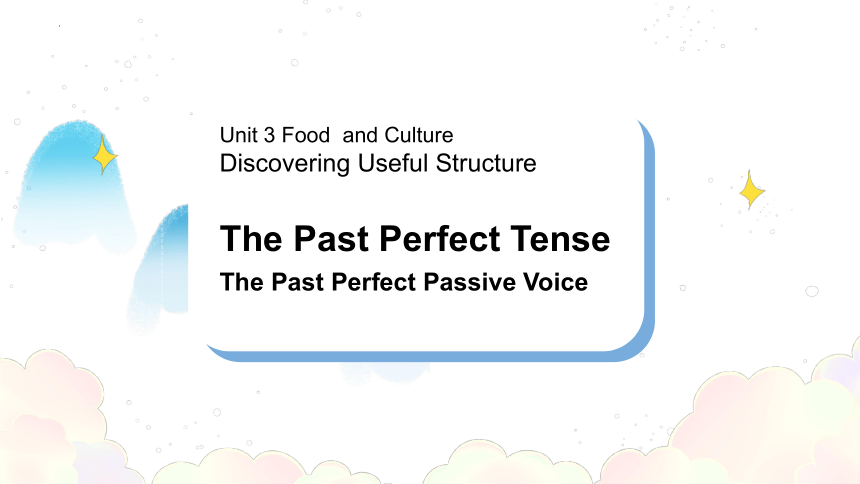 | |
| 格式 | pptx | ||
| 文件大小 | 2.3MB | ||
| 资源类型 | 教案 | ||
| 版本资源 | 人教版(2019) | ||
| 科目 | 英语 | ||
| 更新时间 | 2023-02-11 17:44:40 | ||
图片预览

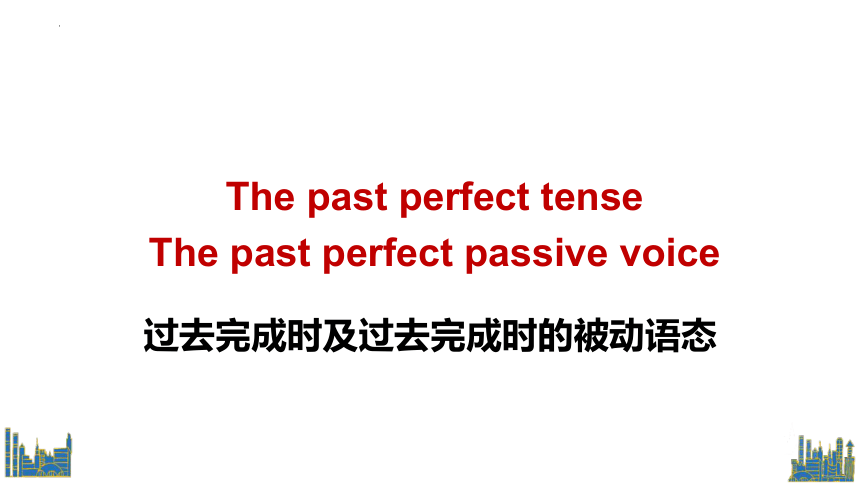
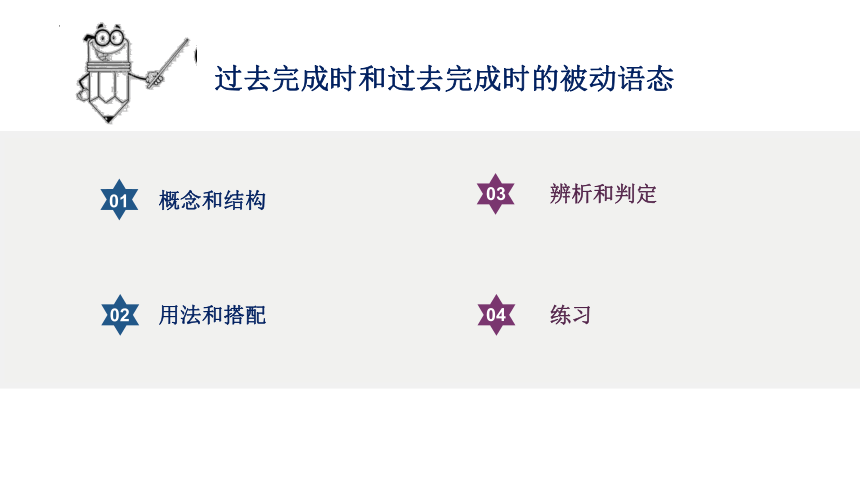
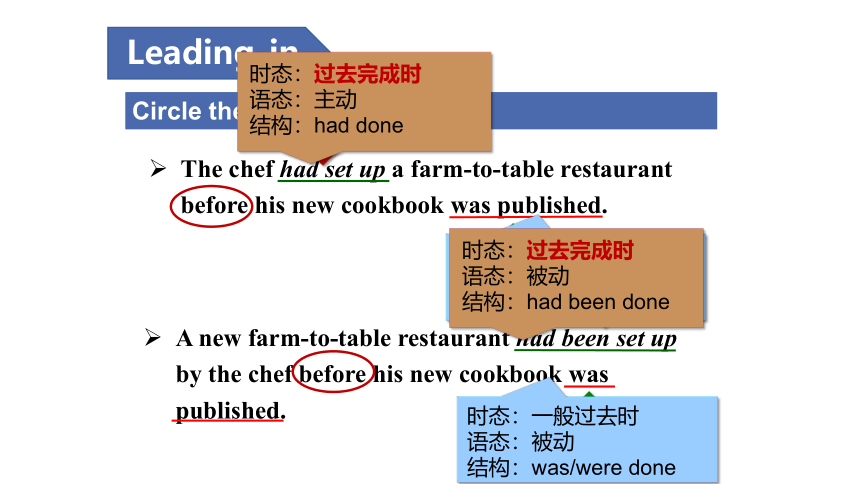
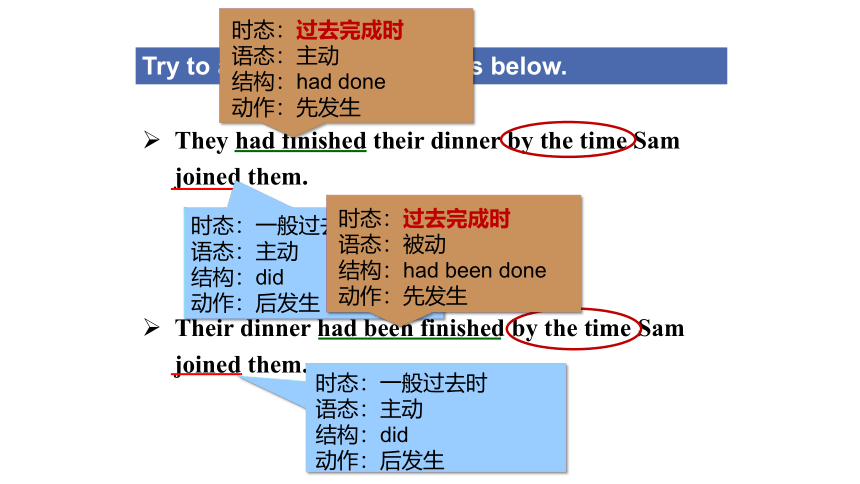
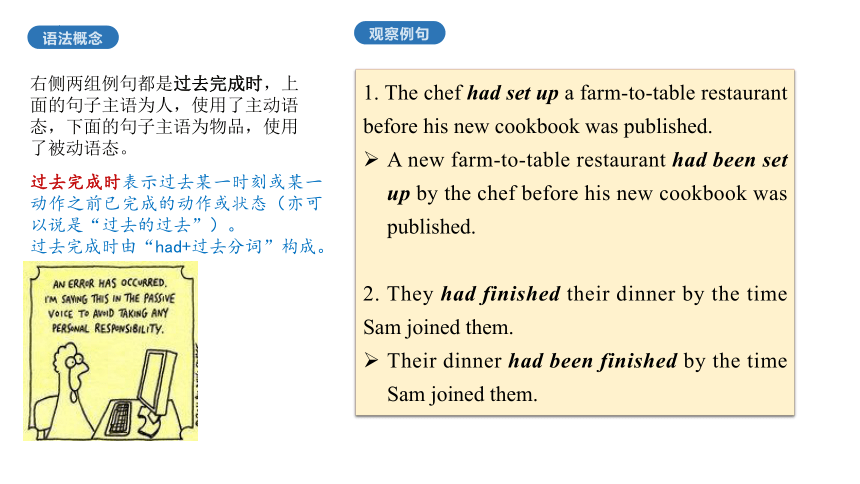
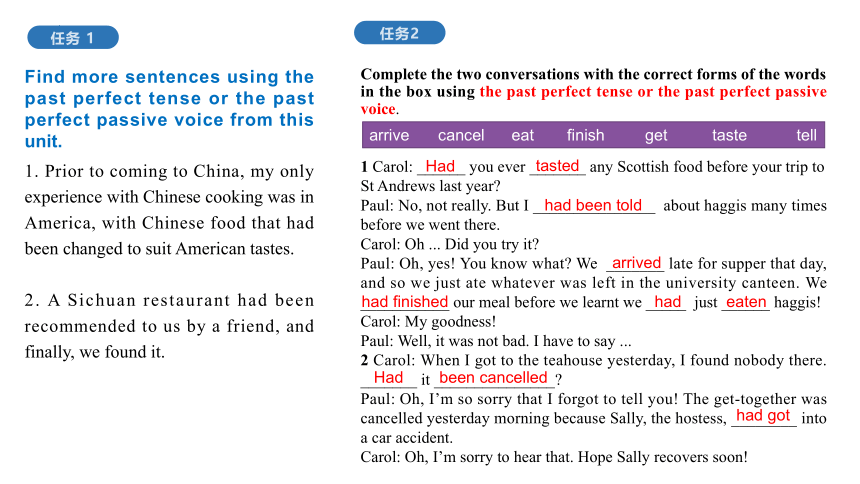
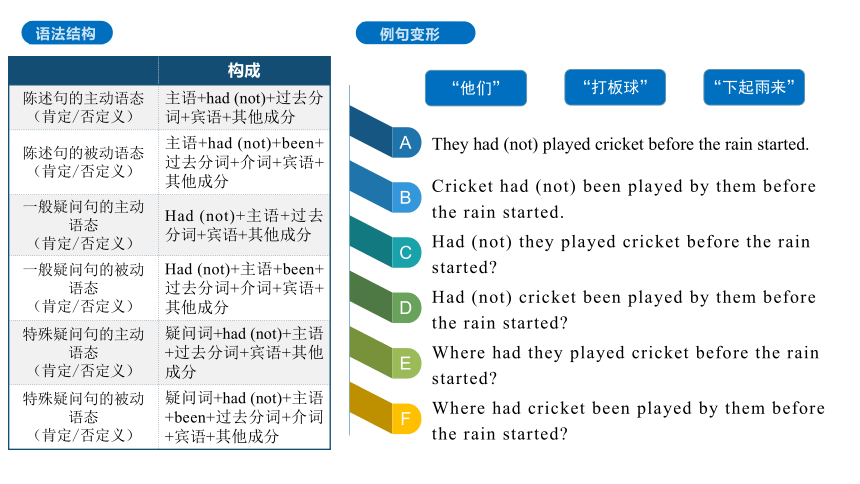
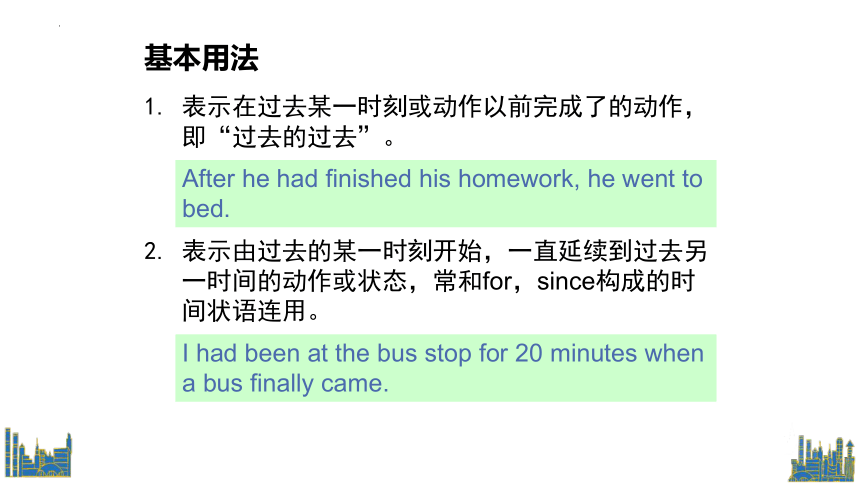
文档简介
(共26张PPT)
Unit 3 Food and Culture
Discovering Useful Structure
The Past Perfect Tense
The Past Perfect Passive Voice
过去完成时及过去完成时的被动语态
The past perfect tense
The past perfect passive voice
概念和结构
用法和搭配
辨析和判定
练习
01
02
04
03
过去完成时和过去完成时的被动语态
Leading-in
Look at the two pairs of sentences.
The chef had set up a farm-to-table restaurant before his new cookbook was published.
A new farm-to-table restaurant had been set up by the chef before his new cookbook was published.
Underline the predicate verbs.
Circle the conjunctions.
后
先
时态:过去完成时
语态:主动
结构:had done
先
时态:一般过去时
语态:被动
结构:was/were done
后
时态:过去完成时
语态:被动
结构:had been done
时态:一般过去时
语态:被动
结构:was/were done
They had finished their dinner by the time Sam joined them.
Their dinner had been finished by the time Sam joined them.
时态:一般过去时
语态:主动
结构:did
动作:后发生
时态:过去完成时
语态:被动
结构:had been done
动作:先发生
时态:一般过去时
语态:主动
结构:did
动作:后发生
Try to analyse the sentences below.
时态:过去完成时
语态:主动
结构:had done
动作:先发生
观察例句
右侧两组例句都是过去完成时,上面的句子主语为人,使用了主动语态,下面的句子主语为物品,使用了被动语态。
1. The chef had set up a farm-to-table restaurant before his new cookbook was published.
A new farm-to-table restaurant had been set up by the chef before his new cookbook was published.
2. They had finished their dinner by the time Sam joined them.
Their dinner had been finished by the time Sam joined them.
语法概念
过去完成时表示过去某一时刻或某一动作之前已完成的动作或状态(亦可以说是“过去的过去”)。
过去完成时由“had+过去分词”构成。
任务2
Find more sentences using the past perfect tense or the past perfect passive voice from this unit.
任务 1
1. Prior to coming to China, my only experience with Chinese cooking was in America, with Chinese food that had been changed to suit American tastes.
2. A Sichuan restaurant had been recommended to us by a friend, and finally, we found it.
Complete the two conversations with the correct forms of the words in the box using the past perfect tense or the past perfect passive voice.
1 Carol: ______ you ever _______ any Scottish food before your trip to St Andrews last year
Paul: No, not really. But I _______________ about haggis many times before we went there.
Carol: Oh ... Did you try it
Paul: Oh, yes! You know what We _______ late for supper that day, and so we just ate whatever was left in the university canteen. We ___________ our meal before we learnt we _____ just ______ haggis!
Carol: My goodness!
Paul: Well, it was not bad. I have to say ...
2 Carol: When I got to the teahouse yesterday, I found nobody there. _______ it _______________
Paul: Oh, I’m so sorry that I forgot to tell you! The get-together was cancelled yesterday morning because Sally, the hostess, ________ into a car accident.
Carol: Oh, I’m sorry to hear that. Hope Sally recovers soon!
arrive cancel eat finish get taste tell
Had
tasted
had been told
arrived
had finished
had
eaten
Had
been cancelled
had got
例句变形
语法结构
B
Cricket had (not) been played by them before the rain started.
C
Had (not) they played cricket before the rain started
D
Had (not) cricket been played by them before the rain started
E
Where had they played cricket before the rain started
A
They had (not) played cricket before the rain started.
F
Where had cricket been played by them before the rain started
构成
陈述句的主动语态 (肯定/否定义) 主语+had (not)+过去分词+宾语+其他成分
陈述句的被动语态 (肯定/否定义) 主语+had (not)+been+过去分词+介词+宾语+其他成分
一般疑问句的主动语态 (肯定/否定义) Had (not)+主语+过去分词+宾语+其他成分
一般疑问句的被动语态 (肯定/否定义) Had (not)+主语+been+ 过去分词+介词+宾语+其他成分
特殊疑问句的主动语态 (肯定/否定义) 疑问词+had (not)+主语+过去分词+宾语+其他成分
特殊疑问句的被动语态 (肯定/否定义) 疑问词+had (not)+主语+been+过去分词+介词 +宾语+其他成分
“他们”
“打板球”
“下起雨来”
基本用法
1. 表示在过去某一时刻或动作以前完成了的动作,
即“过去的过去”。
After he had finished his homework, he went to bed.
2. 表示由过去的某一时刻开始,一直延续到过去另
一时间的动作或状态,常和for,since构成的时
间状语连用。
I had been at the bus stop for 20 minutes when a bus finally came.
用法
I began collecting stamps in February and by November I had collected more than 2000.
我从2月份开始集邮,到11月已收集到2000多枚。
By six o’clock they had worked for 8 hours.
到6点钟他们已经工作了8小时了。(可能还没结束)
与过去完成时连用的时间状语
already (已经), yet (仍然), still (还), just (刚刚), hardly...when (刚……就), scarcely...before (刚……就), ever (曾经), never (从来没有)等,也可以是by (不迟于), before (在……之前), until (直到), as soon as (一……就), by then, by the end of, by that time, until then, by the time+从句等形式。
1. 表示较早的过去
即某一时刻之前已完成的动作或状态。
In 1980,I’d never been to Paris.
1980年之前我从未去过巴黎。
(= I never went there before 1980.)
After we had landed, the plane was searched thoroughly.
我们降落后,飞机被彻底搜查了一遍。
When she heard that her father had died in the accident, she burst out crying.
当她听说她父亲在那次事故中丧生时便大哭起来。
2. 强调过去动作的完成
句中有明显的参照动作或时间状语。
用法
3. 表示过去某个时间或事件之前发生的动作一直延续到过去的另一时间或动作,此时谓语应为延续性动词
We had hoped that you would be able to visit us.
我们原本希望你会来拜访我们。
I had meant to take a good holiday this year, but I was not able to leave.
我本打算今年好好去度假,只是脱不开身。
Experiments of this kind had been conducted in Europe before the World War II.
早在“二战”爆发前,欧洲就进行过这种实验。
He had learned 2,000 English words by the end of last year.
到去年年底为止,他已学会了2000个英语单词了。
By seven o’clock the worker had worked for ten hours.
到7点钟为止,那位工人已经工作10个小时了。
4. 表示过去未曾实现的希望、打算和意图
只适用于下列动词:expect(期待),hope(希望),intend(打算),mean(打算),suppose(料想),think(认为),want(想要)等。
3.叙述过去发生的事情,在已叙述了过去发生的事
情后,反过来追述或补述以前发生的动作时,常
使用过去完成时。
Mr.Smith died yesterday. He had been a good friend of mine.
4. 在含有定语从句的主从复合句中,如果叙述过去的
事,先发生的动作常用过去完成时。
I returned the book that I had borrowed.
5.过去完成时常常用在told,said,knew,heard,
thought等动词后的宾语从句(或间接引语)中,这
时从句中的动作发生在主句表示的过去的动作之前。
He said that he had known her well.
I thought I had sent the letter a week before.
6.状语从句:在过去不同时间发生的两个动作中,
发生在前,用过去完成时;发生在后,用一般过去时。
如:when, before, after, as soon as, till / until引导
的复合句。
When I woke up, it had already stopped raining.
She didn't go to bed until she had finished her work.
注意:
如果两个动作紧接着发生,则常常不用过去完成时,特别是在包含before和after的复合句中,因为从句的动作和主句的动作发生的先后顺序已经非常明确,可以用一般过去时代替过去完成时。
用法
7. 用于宾语从句
过去完成时表示一个过去的动作先于另一个过去动作的用法,多见于宾语从句。一般说来,主句中用了know(知道),realize(意识到),think(认为),suppose(猜想),guess(推测),find(找到),discover(发现),decide(决定),remember(想起),forget(忘记)等动词的一般过去时,如果宾语从句中的动作先于主句的动作,通常用过去完成时:
We realized we had lost our way.
我们意识到我们迷路了。
I didn’t think to ask her if she had passed her examination.
我没有想问她是否考试及格了。
1. I had no difficulty finding Ann’s house because she ____(give) us clear directions before.
2. The twins, who ____ (finish) their homework, were allowed to play badminton in the playground.
3. Sofia looked around at all the faces: she had the impression that she _____ (see) most of the guests before.
4. Shakespeare’s play Hamlet __________ (make) into at least ten different films by the end of last year.
5. A rescue worker risked his life saving two tourists who ______ (trap) in the mountains for two days.
练习
Keys
1. had given
2. had finished
3. had seen
4. had been made
5. had been trapped
例:
① We had hoped that you would be able to visit us.
② I had meant to take a good holiday this year, but
I was not able to leave.
8.动词think,want,hope,mean,plan,intend
等用过去完成时来表示过去未曾实现的想法、希
望、打算或意图等。
过去完成时的标志词和句型
by+过去时间点,before, until, hardly/scarely...when...; no sooner...than;
It was the first / second time that...
句子解析4
辨析
比较:
They had arrived at the station by ten yesterday.
截止到昨天十点,他们已经抵达了车站。
They arrived at the station at ten yesterday.
在昨天十点,他们抵达了车站。
一、过去完成时与一般过去时的区别
虽然这两种时态都表示过去发生的动作或存在的状态,但在使用时应注意以下几点:
1. 时间状语不同:过去完成时在时间上强调“过去的过去”;而一般过去时只强调过去某一特定的时间。
2. 在没有明确的过去时间状语作标志时,谓语动词动作发生的时间先后须依据上下文来判断:先发生的用过去完成时,后发生的则用一般过去时。
3. 当两个或两个以上接连发生的动作用and或but连接时,按时间顺序,只需用一般过去时来代替过去完成时;另外,在before,after,as soon as引导的从句中,由于这些连词本身已经表示出时间的先后,因此也可以用过去时来代替过去完成时。
She had visited her Japanese relatives once in 1993 before she moved in with them in 1996.
She visited her Japanese relatives once in 1993 before she moved in with them in 1996.
因为只有before一个模糊的时间点,因此一般过去时和过去完成时都可以使用。
辨析
I have learned 1000 English words so far.
到目前为止我已经学会了1000个英语单词。
—I’m sorry to keep you waiting. 对不起,让你久等了。
—Oh, not at all. I have been here only a few
minutes. 没什么,我只等了几分钟。
(“等”的动作从过去某一时间点持续到现在。)
观察例句
二、过去完成时与现在完成时的区别
现在完成时表示的动作发生在过去,以现在的时间为基点,但侧重对现在产生的结果或造成的影响,与现在有关,其结构为“助动词have (has) + 过去分词”;过去完成时则是一个相对的时态,以过去时间为基点,它所表示的动作不仅发生在过去,更强调“过去的过去”,只有和过去某时或某动作相比较时,才用到它。
1. He _________ in Shanghai University for four years before he ______ to Beijing.
A. studied, had gone B. had studied, went
C. has studied, goes D. had studied, had gone
2. Tom ____ the CD player for two weeks.
A. has lent B. has borrowed
C. has bought D. has had
解析:
1. B “他去北京之前在上海大学学习了4年。”在上海学习的动作发生在去北京之前,因此横线动词应用过去完成时。故选B。
2. D 此题主要考查现在完成时的延续和非延续动词,根据for two weeks可知应用延续性动词。故选 D。
过去完成时与一般过去时的区别
时态 结构 用法
一般过去时 主动:did/was/were 动作发生在过去的某个时间
被动:was/were done 过去完成时 主动:had done 动作发生在过去的某个时间、动作之前
被动:had been done 过去完成时被动语态与现在完成时被动语
态用法区别:
现在完成时被动语态表示相对于现在来说已被完成的动作,过去完成时被动语态表示相对于过去某一时刻来说已被完成的动作。
答题技巧
1. 由“过去的过去”来判定
过去完成时表示“过去的过去”,是指过去某一动作之前已经发生或完成的动作,即动作有先后关系,动作在前的用过去完成时,在后的用一般过去时。
(1)宾语从句中
当宾语从句的主句为一般过去时,且从句的动作先于主句的动作时,从句要用过去完成时。(在told, said, knew, heard, thought等动词后的宾语从句。)如:
She said that she had seen the film before.
(2)状语从句中
在时间、条件、原因、方式等状语从句中,主、从句的动作发生有先后关系,动作在前的,要用过去完成时,动作在后的,要用一般过去时。如:
After he had finished his homework, he went to bed.
注意:before, after引导的时间状语从句中,由于before和after本身已表达了动作的先后关系,若主、从句表示的动作紧密相连,则主、从句都用一般过去时。如:
After he closed the door, he left the classroom.
(3)表示意向的动词,如hope, wish, expect, think, intend, mean, suppose等,用过去完成时表示“原本……,未能……”。如:
We had hoped that you would come, but you didn’t.
在语法填空等题型中,我们会遇到考查动词的时态语态类型的题目,怎么确定是否使用过去完成时呢?
答题技巧
在语法填空等题型中,我们会遇到考查动词的时态语态类型的题目,怎么确定是否使用过去完成时呢?
2. 由时间状语来判定
一般说来,各种时态都有特定的时间状语。与过去完成时连用的时间状语有:
(1)by + 过去的时间点
I had finished reading the novel by nine o’clock last night.
(2)by the end of + 过去的时间点
We had learned over two thousand English words by the end of last term.
(3)before + 过去的时间点
They had planted six hundred trees before last Wednesday.
3. 根据上、下文来判定
I met Wang Tao in the street yesterday. We hadn’t seen each other since he went to Beijing.
练习
1. Soon Wu Dong _________ (catch) up with Li Lei, then they were neck and neck.
2. Mary said it was at least five years since he _________ (enjoy) a good drink.
3. Xiao Pei said she ______ Hainan for 3 months.
A. has been in B. had been in C. had been to D. had gone to
解析:
1. 根据第一句的固定动词词组catch up with sb及第二句的过去时态可知,填caught。
2. “It was + 时间段 + since”引导的从句中用过去完成时,应填had enjoyed。
3. “小培说她去了海南三个月。”have been to和have gone to都是短暂性的动词短语。所以应填表示状态的have been in。选B。
Ⅰ.单句语法填空。
1. The interviewer was interested in the grades I
_______ (get) in the exams.
2. By the time we got a report, the firemen ________
(put) out the fire in the bar already.
3. She _________ (want) to help you but she had
no time then.
4. All the film tickets ___________ (sell) out when
I got to the cinema.
5. The wallet _______________ (wrap) up in
newspaper and it contained half the money he had
lost.
6. It was the third time that he _________(make) the
same mistake.
had got
had put
had wanted
had been sold
had been wrapped
had made
Ⅱ.完成句子
1.她告诉我她当空中乘务员好几年了。
2. 她说她已来过上海。
3. 我们到日本前学过一点日语。
4. 我不想看那部戏剧,因为我已经看过了。
She told me that she had been an air hostess for quite a few years.
She said that she had been to Shanghai.
We had studied a little Japanese before we came to Japan.
I didn't want to see the play because I had already seen it.
1.He asked me ____ during the summer holidays.
A. where I had been B. where I had gone C. where had I been D. where had I gone
2. What ___ Jane ____ by the time he was seven
A. did; do B. has; done C. did; did D. had; done
3. I ______ 900 English words by the time I was ten.
A. learned B. was learning C. had learned D. has learned
4. By the time my parents reached home yesterday, I _____ the dinner already.
A. had cooked B. cooked C. have cooked D. was cooked
5. She said she __________ the principle already.
A. has seen B. saw C. will see D. had seen
6. She said her family _______ themselves ______ the army during the war.
A. has hidden; from B. had hidden; from C. has hidden; with D. had hidden; with
一、选择正确的选项
KEYS
1.A
2.D
3.C
4.A
5.D
6.B
1.
2.
3.
4.
5.
They will not decide their attitude until they have heard what the speaker has to say.
The station master told us the train had left five minutes before.
I’m tired. I have been working very hard.
She said that she had been typing a paper before I came in.
He had been lying in bed a few minutes when the door bell rang.
二、将下列句子翻译成汉语
Work in pairs. Choose one of these three situations, and make as many sentences as you can using the past perfect tense and the past perfect passive voice. Then make a conversation using these sentences.
Production
EXAMPLE
1. When I set off for
the cafeteria...
... I had just finished my homework.
... I had ordered a taxi online.
... the windows had been closed.
... the light had been switched
off.
Thanks for Your attention!
Unit 3 Food and Culture
Discovering Useful Structure
The Past Perfect Tense
The Past Perfect Passive Voice
过去完成时及过去完成时的被动语态
The past perfect tense
The past perfect passive voice
概念和结构
用法和搭配
辨析和判定
练习
01
02
04
03
过去完成时和过去完成时的被动语态
Leading-in
Look at the two pairs of sentences.
The chef had set up a farm-to-table restaurant before his new cookbook was published.
A new farm-to-table restaurant had been set up by the chef before his new cookbook was published.
Underline the predicate verbs.
Circle the conjunctions.
后
先
时态:过去完成时
语态:主动
结构:had done
先
时态:一般过去时
语态:被动
结构:was/were done
后
时态:过去完成时
语态:被动
结构:had been done
时态:一般过去时
语态:被动
结构:was/were done
They had finished their dinner by the time Sam joined them.
Their dinner had been finished by the time Sam joined them.
时态:一般过去时
语态:主动
结构:did
动作:后发生
时态:过去完成时
语态:被动
结构:had been done
动作:先发生
时态:一般过去时
语态:主动
结构:did
动作:后发生
Try to analyse the sentences below.
时态:过去完成时
语态:主动
结构:had done
动作:先发生
观察例句
右侧两组例句都是过去完成时,上面的句子主语为人,使用了主动语态,下面的句子主语为物品,使用了被动语态。
1. The chef had set up a farm-to-table restaurant before his new cookbook was published.
A new farm-to-table restaurant had been set up by the chef before his new cookbook was published.
2. They had finished their dinner by the time Sam joined them.
Their dinner had been finished by the time Sam joined them.
语法概念
过去完成时表示过去某一时刻或某一动作之前已完成的动作或状态(亦可以说是“过去的过去”)。
过去完成时由“had+过去分词”构成。
任务2
Find more sentences using the past perfect tense or the past perfect passive voice from this unit.
任务 1
1. Prior to coming to China, my only experience with Chinese cooking was in America, with Chinese food that had been changed to suit American tastes.
2. A Sichuan restaurant had been recommended to us by a friend, and finally, we found it.
Complete the two conversations with the correct forms of the words in the box using the past perfect tense or the past perfect passive voice.
1 Carol: ______ you ever _______ any Scottish food before your trip to St Andrews last year
Paul: No, not really. But I _______________ about haggis many times before we went there.
Carol: Oh ... Did you try it
Paul: Oh, yes! You know what We _______ late for supper that day, and so we just ate whatever was left in the university canteen. We ___________ our meal before we learnt we _____ just ______ haggis!
Carol: My goodness!
Paul: Well, it was not bad. I have to say ...
2 Carol: When I got to the teahouse yesterday, I found nobody there. _______ it _______________
Paul: Oh, I’m so sorry that I forgot to tell you! The get-together was cancelled yesterday morning because Sally, the hostess, ________ into a car accident.
Carol: Oh, I’m sorry to hear that. Hope Sally recovers soon!
arrive cancel eat finish get taste tell
Had
tasted
had been told
arrived
had finished
had
eaten
Had
been cancelled
had got
例句变形
语法结构
B
Cricket had (not) been played by them before the rain started.
C
Had (not) they played cricket before the rain started
D
Had (not) cricket been played by them before the rain started
E
Where had they played cricket before the rain started
A
They had (not) played cricket before the rain started.
F
Where had cricket been played by them before the rain started
构成
陈述句的主动语态 (肯定/否定义) 主语+had (not)+过去分词+宾语+其他成分
陈述句的被动语态 (肯定/否定义) 主语+had (not)+been+过去分词+介词+宾语+其他成分
一般疑问句的主动语态 (肯定/否定义) Had (not)+主语+过去分词+宾语+其他成分
一般疑问句的被动语态 (肯定/否定义) Had (not)+主语+been+ 过去分词+介词+宾语+其他成分
特殊疑问句的主动语态 (肯定/否定义) 疑问词+had (not)+主语+过去分词+宾语+其他成分
特殊疑问句的被动语态 (肯定/否定义) 疑问词+had (not)+主语+been+过去分词+介词 +宾语+其他成分
“他们”
“打板球”
“下起雨来”
基本用法
1. 表示在过去某一时刻或动作以前完成了的动作,
即“过去的过去”。
After he had finished his homework, he went to bed.
2. 表示由过去的某一时刻开始,一直延续到过去另
一时间的动作或状态,常和for,since构成的时
间状语连用。
I had been at the bus stop for 20 minutes when a bus finally came.
用法
I began collecting stamps in February and by November I had collected more than 2000.
我从2月份开始集邮,到11月已收集到2000多枚。
By six o’clock they had worked for 8 hours.
到6点钟他们已经工作了8小时了。(可能还没结束)
与过去完成时连用的时间状语
already (已经), yet (仍然), still (还), just (刚刚), hardly...when (刚……就), scarcely...before (刚……就), ever (曾经), never (从来没有)等,也可以是by (不迟于), before (在……之前), until (直到), as soon as (一……就), by then, by the end of, by that time, until then, by the time+从句等形式。
1. 表示较早的过去
即某一时刻之前已完成的动作或状态。
In 1980,I’d never been to Paris.
1980年之前我从未去过巴黎。
(= I never went there before 1980.)
After we had landed, the plane was searched thoroughly.
我们降落后,飞机被彻底搜查了一遍。
When she heard that her father had died in the accident, she burst out crying.
当她听说她父亲在那次事故中丧生时便大哭起来。
2. 强调过去动作的完成
句中有明显的参照动作或时间状语。
用法
3. 表示过去某个时间或事件之前发生的动作一直延续到过去的另一时间或动作,此时谓语应为延续性动词
We had hoped that you would be able to visit us.
我们原本希望你会来拜访我们。
I had meant to take a good holiday this year, but I was not able to leave.
我本打算今年好好去度假,只是脱不开身。
Experiments of this kind had been conducted in Europe before the World War II.
早在“二战”爆发前,欧洲就进行过这种实验。
He had learned 2,000 English words by the end of last year.
到去年年底为止,他已学会了2000个英语单词了。
By seven o’clock the worker had worked for ten hours.
到7点钟为止,那位工人已经工作10个小时了。
4. 表示过去未曾实现的希望、打算和意图
只适用于下列动词:expect(期待),hope(希望),intend(打算),mean(打算),suppose(料想),think(认为),want(想要)等。
3.叙述过去发生的事情,在已叙述了过去发生的事
情后,反过来追述或补述以前发生的动作时,常
使用过去完成时。
Mr.Smith died yesterday. He had been a good friend of mine.
4. 在含有定语从句的主从复合句中,如果叙述过去的
事,先发生的动作常用过去完成时。
I returned the book that I had borrowed.
5.过去完成时常常用在told,said,knew,heard,
thought等动词后的宾语从句(或间接引语)中,这
时从句中的动作发生在主句表示的过去的动作之前。
He said that he had known her well.
I thought I had sent the letter a week before.
6.状语从句:在过去不同时间发生的两个动作中,
发生在前,用过去完成时;发生在后,用一般过去时。
如:when, before, after, as soon as, till / until引导
的复合句。
When I woke up, it had already stopped raining.
She didn't go to bed until she had finished her work.
注意:
如果两个动作紧接着发生,则常常不用过去完成时,特别是在包含before和after的复合句中,因为从句的动作和主句的动作发生的先后顺序已经非常明确,可以用一般过去时代替过去完成时。
用法
7. 用于宾语从句
过去完成时表示一个过去的动作先于另一个过去动作的用法,多见于宾语从句。一般说来,主句中用了know(知道),realize(意识到),think(认为),suppose(猜想),guess(推测),find(找到),discover(发现),decide(决定),remember(想起),forget(忘记)等动词的一般过去时,如果宾语从句中的动作先于主句的动作,通常用过去完成时:
We realized we had lost our way.
我们意识到我们迷路了。
I didn’t think to ask her if she had passed her examination.
我没有想问她是否考试及格了。
1. I had no difficulty finding Ann’s house because she ____(give) us clear directions before.
2. The twins, who ____ (finish) their homework, were allowed to play badminton in the playground.
3. Sofia looked around at all the faces: she had the impression that she _____ (see) most of the guests before.
4. Shakespeare’s play Hamlet __________ (make) into at least ten different films by the end of last year.
5. A rescue worker risked his life saving two tourists who ______ (trap) in the mountains for two days.
练习
Keys
1. had given
2. had finished
3. had seen
4. had been made
5. had been trapped
例:
① We had hoped that you would be able to visit us.
② I had meant to take a good holiday this year, but
I was not able to leave.
8.动词think,want,hope,mean,plan,intend
等用过去完成时来表示过去未曾实现的想法、希
望、打算或意图等。
过去完成时的标志词和句型
by+过去时间点,before, until, hardly/scarely...when...; no sooner...than;
It was the first / second time that...
句子解析4
辨析
比较:
They had arrived at the station by ten yesterday.
截止到昨天十点,他们已经抵达了车站。
They arrived at the station at ten yesterday.
在昨天十点,他们抵达了车站。
一、过去完成时与一般过去时的区别
虽然这两种时态都表示过去发生的动作或存在的状态,但在使用时应注意以下几点:
1. 时间状语不同:过去完成时在时间上强调“过去的过去”;而一般过去时只强调过去某一特定的时间。
2. 在没有明确的过去时间状语作标志时,谓语动词动作发生的时间先后须依据上下文来判断:先发生的用过去完成时,后发生的则用一般过去时。
3. 当两个或两个以上接连发生的动作用and或but连接时,按时间顺序,只需用一般过去时来代替过去完成时;另外,在before,after,as soon as引导的从句中,由于这些连词本身已经表示出时间的先后,因此也可以用过去时来代替过去完成时。
She had visited her Japanese relatives once in 1993 before she moved in with them in 1996.
She visited her Japanese relatives once in 1993 before she moved in with them in 1996.
因为只有before一个模糊的时间点,因此一般过去时和过去完成时都可以使用。
辨析
I have learned 1000 English words so far.
到目前为止我已经学会了1000个英语单词。
—I’m sorry to keep you waiting. 对不起,让你久等了。
—Oh, not at all. I have been here only a few
minutes. 没什么,我只等了几分钟。
(“等”的动作从过去某一时间点持续到现在。)
观察例句
二、过去完成时与现在完成时的区别
现在完成时表示的动作发生在过去,以现在的时间为基点,但侧重对现在产生的结果或造成的影响,与现在有关,其结构为“助动词have (has) + 过去分词”;过去完成时则是一个相对的时态,以过去时间为基点,它所表示的动作不仅发生在过去,更强调“过去的过去”,只有和过去某时或某动作相比较时,才用到它。
1. He _________ in Shanghai University for four years before he ______ to Beijing.
A. studied, had gone B. had studied, went
C. has studied, goes D. had studied, had gone
2. Tom ____ the CD player for two weeks.
A. has lent B. has borrowed
C. has bought D. has had
解析:
1. B “他去北京之前在上海大学学习了4年。”在上海学习的动作发生在去北京之前,因此横线动词应用过去完成时。故选B。
2. D 此题主要考查现在完成时的延续和非延续动词,根据for two weeks可知应用延续性动词。故选 D。
过去完成时与一般过去时的区别
时态 结构 用法
一般过去时 主动:did/was/were 动作发生在过去的某个时间
被动:was/were done 过去完成时 主动:had done 动作发生在过去的某个时间、动作之前
被动:had been done 过去完成时被动语态与现在完成时被动语
态用法区别:
现在完成时被动语态表示相对于现在来说已被完成的动作,过去完成时被动语态表示相对于过去某一时刻来说已被完成的动作。
答题技巧
1. 由“过去的过去”来判定
过去完成时表示“过去的过去”,是指过去某一动作之前已经发生或完成的动作,即动作有先后关系,动作在前的用过去完成时,在后的用一般过去时。
(1)宾语从句中
当宾语从句的主句为一般过去时,且从句的动作先于主句的动作时,从句要用过去完成时。(在told, said, knew, heard, thought等动词后的宾语从句。)如:
She said that she had seen the film before.
(2)状语从句中
在时间、条件、原因、方式等状语从句中,主、从句的动作发生有先后关系,动作在前的,要用过去完成时,动作在后的,要用一般过去时。如:
After he had finished his homework, he went to bed.
注意:before, after引导的时间状语从句中,由于before和after本身已表达了动作的先后关系,若主、从句表示的动作紧密相连,则主、从句都用一般过去时。如:
After he closed the door, he left the classroom.
(3)表示意向的动词,如hope, wish, expect, think, intend, mean, suppose等,用过去完成时表示“原本……,未能……”。如:
We had hoped that you would come, but you didn’t.
在语法填空等题型中,我们会遇到考查动词的时态语态类型的题目,怎么确定是否使用过去完成时呢?
答题技巧
在语法填空等题型中,我们会遇到考查动词的时态语态类型的题目,怎么确定是否使用过去完成时呢?
2. 由时间状语来判定
一般说来,各种时态都有特定的时间状语。与过去完成时连用的时间状语有:
(1)by + 过去的时间点
I had finished reading the novel by nine o’clock last night.
(2)by the end of + 过去的时间点
We had learned over two thousand English words by the end of last term.
(3)before + 过去的时间点
They had planted six hundred trees before last Wednesday.
3. 根据上、下文来判定
I met Wang Tao in the street yesterday. We hadn’t seen each other since he went to Beijing.
练习
1. Soon Wu Dong _________ (catch) up with Li Lei, then they were neck and neck.
2. Mary said it was at least five years since he _________ (enjoy) a good drink.
3. Xiao Pei said she ______ Hainan for 3 months.
A. has been in B. had been in C. had been to D. had gone to
解析:
1. 根据第一句的固定动词词组catch up with sb及第二句的过去时态可知,填caught。
2. “It was + 时间段 + since”引导的从句中用过去完成时,应填had enjoyed。
3. “小培说她去了海南三个月。”have been to和have gone to都是短暂性的动词短语。所以应填表示状态的have been in。选B。
Ⅰ.单句语法填空。
1. The interviewer was interested in the grades I
_______ (get) in the exams.
2. By the time we got a report, the firemen ________
(put) out the fire in the bar already.
3. She _________ (want) to help you but she had
no time then.
4. All the film tickets ___________ (sell) out when
I got to the cinema.
5. The wallet _______________ (wrap) up in
newspaper and it contained half the money he had
lost.
6. It was the third time that he _________(make) the
same mistake.
had got
had put
had wanted
had been sold
had been wrapped
had made
Ⅱ.完成句子
1.她告诉我她当空中乘务员好几年了。
2. 她说她已来过上海。
3. 我们到日本前学过一点日语。
4. 我不想看那部戏剧,因为我已经看过了。
She told me that she had been an air hostess for quite a few years.
She said that she had been to Shanghai.
We had studied a little Japanese before we came to Japan.
I didn't want to see the play because I had already seen it.
1.He asked me ____ during the summer holidays.
A. where I had been B. where I had gone C. where had I been D. where had I gone
2. What ___ Jane ____ by the time he was seven
A. did; do B. has; done C. did; did D. had; done
3. I ______ 900 English words by the time I was ten.
A. learned B. was learning C. had learned D. has learned
4. By the time my parents reached home yesterday, I _____ the dinner already.
A. had cooked B. cooked C. have cooked D. was cooked
5. She said she __________ the principle already.
A. has seen B. saw C. will see D. had seen
6. She said her family _______ themselves ______ the army during the war.
A. has hidden; from B. had hidden; from C. has hidden; with D. had hidden; with
一、选择正确的选项
KEYS
1.A
2.D
3.C
4.A
5.D
6.B
1.
2.
3.
4.
5.
They will not decide their attitude until they have heard what the speaker has to say.
The station master told us the train had left five minutes before.
I’m tired. I have been working very hard.
She said that she had been typing a paper before I came in.
He had been lying in bed a few minutes when the door bell rang.
二、将下列句子翻译成汉语
Work in pairs. Choose one of these three situations, and make as many sentences as you can using the past perfect tense and the past perfect passive voice. Then make a conversation using these sentences.
Production
EXAMPLE
1. When I set off for
the cafeteria...
... I had just finished my homework.
... I had ordered a taxi online.
... the windows had been closed.
... the light had been switched
off.
Thanks for Your attention!
